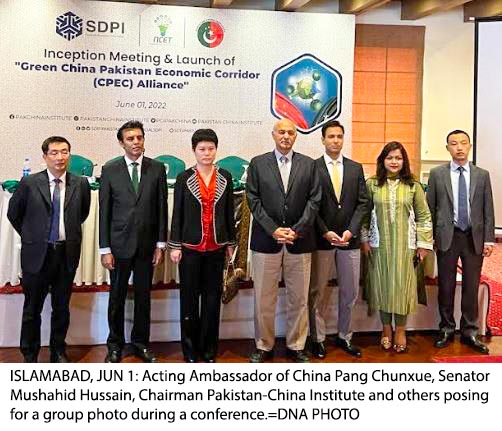Islamabad, JUN 1 /DNA/ – Pakistan-China Institute (PCI), in collaboration with Sustainable Development Policy Institute (SDPI), hosted the launch event and the inception meeting of the first-of-its-kind “Green China Pakistan Economic Corridor (CPEC) Alliance”. The conference was attended by over 40 participants and featured 6 panelists including Senator Mushahid Hussain Sayed, Chairman Pakistan-China Institute, Acting Ambassador of the People’s Republic of China Ms. Pang Chunxue, Zhang Jun, CEO, China Three Gorges (CTG) Corporation, Muhammad Aurangzeb, CEO, Habib Bank Limited (HBL), Senator Seemin Ezdi, Chairperson of the Senate Committee on Climate Change, Dr Abid Suleri, Executive Director, Sustainable Development Policy Institute (SDPI). The event was moderated by Mustafa Hyder Sayed, Executive Director Pakistan-China Institute.
The goal of the establishment of the Green CPEC Alliance with members from both countries’ governments, investors, as well as civil society, and environmental experts, is to support, accelerate and promote this transition within Pakistan and the Belt and Road Initiative (BRI). The Alliance aims to green and decarbonize CPEC (China Pakistan Economic Corridor) by supporting a re-direction of Chinese infrastructure investments away from emission-intensive investments and towards green infrastructure projects, e.g., from coal to renewable energy, like wind, solar and hydropower.
Senator Mushahid Hussain Sayed, Chairman Pakistan-China Institute, in his welcome remarks expressed great pleasure in being part of the inception and thanked the presence of all esteemed guests. During his speech, he felt it integral to press upon the urgency of the climate change situation in the world by arguing to prioritize the need for a green Pakistan, including redefining the notion of national security from a military-centric approach to Human Security, cantering on climate change, population planning, food security and water scarcity. . Senator Mushashid also shared his experiences from the COP 26 meeting in Glasgow. He acknowledged that some work was being done on an international level, however, not much progress was made on Green Finance. He made it clear that there was a need to accelerate the efforts required to mitigate the effects of climate change at the community level in Pakistan, referring to his initiatives to launch the first public hearings on environment and climate change in the Pakistan Parliament.
Senator Mushahid Hussain Sayed was followed by the Acting Ambassador of the People’s Republic of China in Pakistan Ms. Pang Chunxue. She expressed her delight to be part of the event. Her remarks revolved around the efforts of China to mitigate climate change threats available globally. She emphasized Chinese initiatives like the International Green Development Coalition which have to their roots the objective of ensuring that all Chinese investments that are part of the Belt and Road Initiative are made green. She talked about the various hydropower and solar power plants that have been built as alternatives to the coal power projects which are currently benefiting the people of Pakistan by addressing their energy needs. Lastly, she expressed China’s desire to continue efforts that will help make the CPEC and the BRI green and sustainable for the country, adding that China has publicly declared the intention no longer to finance or build coal-fired plants overseas.
Apart from the keynote speakers and the special guests, the Executive Director of the Pakistan-China Institute also presented the concept of the Green CPEC Alliance to the notables present at the conference. Dr Hina Aslam from the Sustainable Development Policy Institute was also present alongside him. They explained the objectives and aims of the Alliance. Mr. Mustafa Sayed emphasized that this alliance is a first-of-its-kind initiative that is bringing all stakeholders together to deliberate options that can make the CPEC green and sustainable. He explained that the focus was on making sure that the promises made by the two governments on international fora like COP 26 and COP 23 are materialized and given practicality. This Alliance will focus on producing research in the form of policy briefs, reports, and conferences that will push policymakers and other stakeholders to opt for greener options in development.
Mr Zhang Jun, CEO of China Three Gorges (CTG) Corporation said that CTG is committed to its mission statement i.e., ‘Provide clean energy and build beautiful communities together’. CTG is committed to expanding its new energy business globally as part of the BRI plan and has established four international business lines: investment, construction, operation, and consultancy. CTG is also playing an important role in the implementation of the China-Pakistan Economic Corridor (CPEC), which is a bilateral agreement between the Chinese and Pakistani governments for regional connectivity and infrastructure development. We believe that the CPEC Agreement will provide huge socio-economic advantages to the people of both China and Pakistan, and we hope that in the future, we will be able to contribute to more clean projects under the CPEC Agreement that will provide even more socio-economic benefits.
Muhammad Aurangzeb, CEO of Habib Bank Limited (HBL) appreciated the uniqueness of the initiative launched by the Pakistan-China Institute and Sustainable Development Policy Institute. He said that HBL is closely linked with CPEC projects in their financing as well as structuring. Commenting on CPEC Phase 2, he remarked that the second phase is all about building further on the first phase of the project which has improved transport infrastructure and alleviated the energy crisis in Pakistan. He also expressed hope that the Special Economic Zones (SEZs) being developed under CPEC, like Rashakai SEZ, would boost industrialization in the country. Seeing this opportunity, HBL has already opened a branch in Rashakai. It is worthy to note that HBL is the signatory to the Green Investment Principles for greening investment in the Belt and Road. These include seven principles at three levels, i.e., strategy, operations, and innovation. Lastly, he said he recommended learning from China’s experience in this regard since 40% of green bonds issued today are coming from China. HBL is the first Pakistani bank to open a branch in Beijing.
Dr Abid Suleri, Executive Director, Sustainable Development Policy Institute (SDPI) termed the launch of ‘Green CPEC Alliance’ a timely initiative since humanity is facing the question of survival in lieu of the looming threat of climate change. Appreciating China’s role in leading the initiatives to combat climate change, he said China has much to offer to developing as well as developed countries in terms of enhancing their capacity to combat climate change. Moreover, he said that the world has now realized how urgent this is to give attention to this threat. In this regard, Foreign Minister of Pakistan Bilawal Bhutto Zardari attended the Global Food Security Summit last week in which two key questions were discussed: i.e., the impact of the Russia-Ukraine conflict on food security and how to ensure food security amidst climate change. This speaks volumes about the urgency of the matter.
In her closing remarks,Senator Seemin Ezdi, Chairperson of the Senate Committee on Climate Change said that Pakistan contributes less than 1% to climate change but is the 8th most affected country in the world. It is the need of the hour, she maintained, to plan for the future since it is the issue that affects the whole of humanity, not only the countries responsible for it. Moreover, she expressed happiness with China’s desire to pursue green development through the China Pakistan Economic Corridor (CPEC).
The session lasted for 2 hours and had participation from a diverse group of audience including students, media, civil society, policymakers, parliamentarians, and environmentalists.











